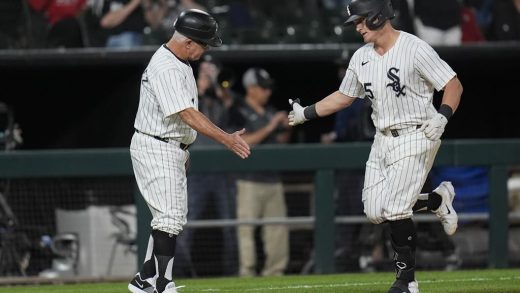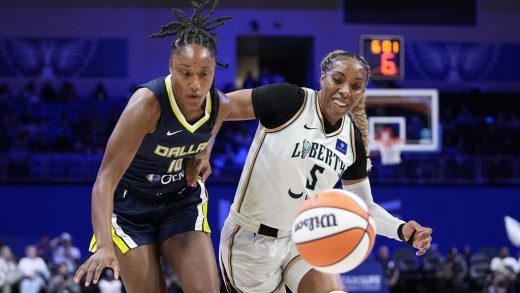:format(webp)/https://www.thestar.com/content/dam/thestar/entertainment/stage/2023/07/10/judy-garland-having-a-strong-mother-and-finding-her-voice-kiki-moritsugu-on-her-2023-fringe-festival-show-a-woman-is-/frank_moritsugu_on_star_truck.jpg)
Actor Kiki Moritsugu says she owes her existence to the Toronto Star.
Back in the 1960s, her father, Frank Moritsugu, was a book, TV and radio reviewer for this very newspaper, and he was assigned to interview an Anglo-Canadian actor living in Montreal named Félixe Fitzgerald, who was then starring in a popular Quebecois TV series.
The two hit it off and kept in touch.
“There were a lot of long-distance phone calls, plus handwritten and typed letters,” said Kiki Moritsugu. “Frank was a journalist, so he probably kept carbon copies of all of them.”
Eventually they became a couple, and Félixe left Montreal to live in Toronto and raise a family, including Kiki. They married when Kiki was three. They split when she was 11.
Not all of her parents’ complicated personal lives — divorces, affairs — make it into her solo cabaret show, “A Woman Is …” which plays the Toronto Fringe Festival through July 16. But she does discuss the unlikely story of how they met.
“A Woman Is …” focuses mostly on Kiki’s relationship with her larger-than-life, glamorous mother, who raised her and her two sisters after the divorce. Fitzgerald, also known as Jo Hutchings, had trained at London’s prestigious Royal Academy of Dramatic Art and, according to Moritsugu, spoke in these “beautiful, round tones — I imitate her in the show.”
Moritsugu, who was born in Toronto but now lives in Madison, Wisconsin, says she idolized her mom early on and got her own love of performing from seeing her in regional theatre productions. Hutchings performed in “Cat on a Hot Tin Roof” at Theatre Aquarius, “Private Lives” in summer stock at the Red Barn Theatre.
“I would see her up onstage, see her headshots and production photos, and she was so glamorous and beautiful. I absolutely wanted to emulate her. The problem is, she wanted me to emulate her too.”
Early on, Moritsugu struggled to find an identity of her own. Her mom even insisted on choosing her audition material.
“She wanted me to be a big star and tried to live vicariously through me,” said Moritsugu.
“I trained as a dancer partly because it was a thing she didn’t do. Dance gave me a lot of confidence. And then I went off to the Banff School of Fine Arts, back when they still had a musical theatre program.”
Moritsugu’s big break came when she was hired for the Canadian national tour of the blockbuster musical “Cats” in 1988.
“We felt like rock stars,” she said. “We’d be walking down the streets of Vancouver with our ‘Cats’ jackets on, and people would let us into clubs and give us VIP service. It was wild. I was 22 and thinking, ‘Wow, is this how my whole career is going to be like?’”
She moved to New York City in 1989 and stayed there for nearly 15 years, playing various roles, including one in the Broadway premiere of the infamous, short-lived “Shogun: The Musical.” Moritsugu recounts the star-crossed production in the show and makes it sound like the original “Spider-Man: Turn Off the Dark” in terms of the danger for its cast and crew.
“‘Shogun’ was the first musical on Broadway to have automated lighting, flies and winches,” said Moritsugu.
“Much of this equipment came from the rock concert world and here you had stage hands who hadn’t worked with anything automated. During one rehearsal, our technical director got knocked out cold for 10 minutes by an automated fly. During a preview, I got hit in the head and had to go to the emergency room.
“And two days before opening, when the critics, including Frank Rich from the New York Times, were in the house, a fly that had been tied up in the first act broke free in the second act and knocked the leading man out cold, then swooped into the orchestra pit, where the conductor had to duck out of the way. Someone actually yelled, ‘Is there a doctor in the house?’”
While in New York, she also worked as the personal assistant of “Fiddler on the Roof” lyricist Sheldon Harnick, who passed away on June 23.
“He was a wonderful person and someone who was very dear and close to me,” she said. “I wanted to sing a song of his in the show (the number ‘The Boston Beguine,’ from ‘New Faces of 1952’), because he was such an important part of my life.”
She also has an entire section in the Fringe show on “yellow face,” in which she discusses the racism she encountered in the entertainment industry.
“When I first started out, I did a lot of commercials. Back then, they would want one token Asian actor or one token Black actor. They wanted the Asian person to ‘not be too Asian,’ and they wanted the Black person to be ‘light-skinned.’ Just so they could say they were making an effort to be diverse, although they wouldn’t have used that term back then. They were just paying lip service.”
The fact that she very rarely met any other half-Asian, half-Caucasian people made her realize how much her parents were trailblazers.
“This was in the ’60s, the era of Loving v. Virginia,” she said, referring to the landmark Supreme Court case that struck down state laws banning interracial marriage in the U.S. “It was very unusual.”
Moritsugu ends the show with “Maybe This Time,” the big 11 o’clock number from “Cabaret,” and it has special meaning for her.
“My mother told me never to sing anything that Judy Garland or Liza Minnelli sang, because I was going to be compared to them and wouldn’t measure up,” she said. “So this is me taking ownership of the song.”
Moritsugu’s mother died 20 years ago, and she admits she wouldn’t have been able to write — with co-writer Danielle Dresen — or perform the show if her mother had still been alive. (Her father, journalist Frank, just celebrated his 100th birthday last December.)
“Her death was devastating, but it was also liberating,” said Moritsugu. “It meant that I got a chance to finally forge my own identity and not feel conflicted about what I was supposed to be.”
And what would her glamorous mother have thought of the show?
“I think she would have had a hard time with it,” said Moritsugu. “I’m pretty honest about my feelings. They’re complicated. But to me, that’s what makes us so interesting. Human behaviour is the most fascinating subject there is. That’s probably why I’m an actor, to explore all that.”
JOIN THE CONVERSATION
does not endorse these opinions.



